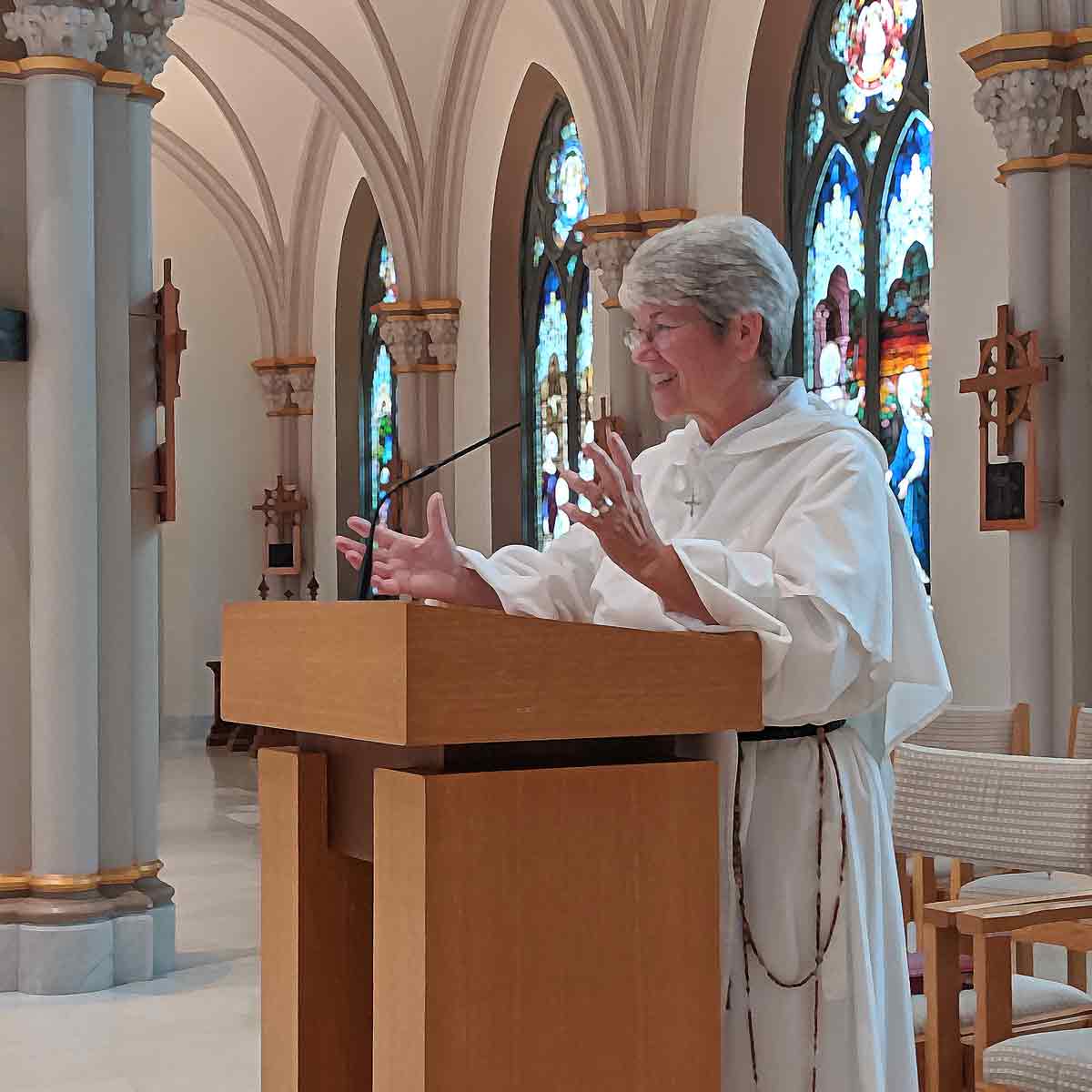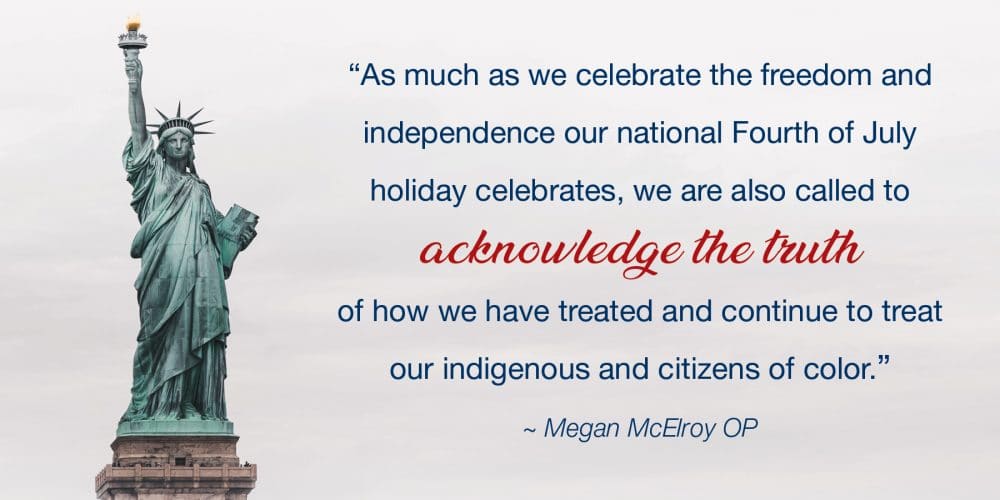
“As much as we celebrate the freedom and independence our national 4th of July holiday celebrates, we are also called to acknowledge the truth of how we have treated and continue to treat our indigenous and citizens of color,” says Megan McElroy OP.
 Sr. Megan McElroy preached The Roads We Travel, based on the June 30, 2021 liturgy reading: Matthew 8:28-34, and produced for The Word daily homilies from the Order of Preachers. Sr. Megan challenges us to consider how we might face the demons of racism and white supremacy in our country.
Sr. Megan McElroy preached The Roads We Travel, based on the June 30, 2021 liturgy reading: Matthew 8:28-34, and produced for The Word daily homilies from the Order of Preachers. Sr. Megan challenges us to consider how we might face the demons of racism and white supremacy in our country.
“Here in the United States, there are two demons we as a nation must face, and the road to do so is fraught with terror because we don’t wish to face the truth. The demons are racism and White Supremacy. To dismantle these structures, to dispossess these demons of their power, will mean reconfiguring our entire economic, education, health, religious, police, military, and political realities. For far too long, as long as our nation’s existence, we have avoided this road and built an entire highway system that instead has many of us traveling by way of ignorance and privilege. To step onto the road that leads to Gadara – so to speak (Matthew 8:28-3) – is choose life, healing, and wholeness.”
“What roads are we reluctant to travel because of the demons we might encounter?” asks Sr. Megan.
- Read Sr. Megan’s homily in full below.
- Listen to June 30 theWord
The Road to Gadara
HOMILY: Wednesday of the 13th Week of Ordinary Time
Readings: Genesis 21:5, 8-20a; Ps 34; Matthew 8:28-34
June 30, 2021 by Megan McElroy OP
Gospel: Mt 8:28-34
When Jesus came to the territory of the Gadarenes, two demoniacs who were coming from the tombs met him. They were so savage that no one could travel by that road.
They cried out, “What have you to do with us, Son of God? Have you come here to torment us before the appointed time?” Some distance away a herd of many swine was feeding. The demons pleaded with him, “If you drive us out, send us into the herd of swine.” And he said to them, “Go then!” They came out and entered the swine, and the whole herd rushed down the steep bank into the sea where they drowned. The swineherds ran away, and when they came to the town they reported everything, what had happened to the demoniacs. Thereupon the whole town came out to meet Jesus, and when they saw him they begged him to leave their district.
It would appear that in today’s gospel, Jesus has gone off the beaten path. He has left his home base area of Capernaum by crossing the sea of Galilee, landed in the Gentile area of the Decapolis, and traveled the road toward Gadara. There he encountered two people possessed by demons. The road Jesus was on, we’re told, no one could travel because of the two demons, so savage were they. Instead of avoiding this road, Jesus traveled it, heading straight toward this place of chaos, death, and destruction.
Are there any such roads in our lives, roads that only lead to death, destruction, and chaos? If we dared to travel such a road, what demons would be awaiting us there? What are the roads we don’t want to travel because we know what awaits us? For each one of us, there is something that invites us to consider what is so savage, so terrifying in our lives that deflects us from our journey, that finds us wanting to look for other roads to travel.
Jesus, though, doesn’t shy away from this road or the demons. He doesn’t even seem surprised to encounter them. He listens and responds to them doing as they ask by sending them into the herd of swine, which promptly jump off the cliff and drown in the sea. If only facing our demons and expelling them was so easy!
It’s interesting to note that there is absolutely no response from the two who were healed of their demonic possession nor from any witnesses to the event other than the swineherds. They ran to the town and reported what had happened. The gospel writer tells us that the whole town came out to meet Jesus, but unlike the response to the Samaritan woman’s report of Jesus to her townspeople, this community begs Jesus to leave, not just the town but the district.
It’s a curious response since after hearing about such a miracle as the healing of the two who had been so savagely possessed, most people would be inclined to hear more from Jesus, to see if there might be more healings in the making. Why was this so? What was the resistance to life, to healing, to peace?
The Decapolis was an area of ten cities that long before the time of Jesus had been established for Greeks. They had their own social system consisting of courts, language, culture, currency, armies, and political status. Once Rome came to power, however, the Decapolis communities gave their allegiance to the Empire, received its protection, and functioned as an autonomous city-state dependent on Rome. As with the people of Samaria, there was great animosity between the Jews and the Greeks of the Decapolis. With this as backdrop, then, Jesus’ action was seen as a threat to the established order that could and would bring consequences. For the Gadarene community, maintaining social and economic interests far outweighed healing and wholeness.
I asked earlier what roads there are that we are reluctant to travel because of the demons we might encounter. Here in the United States, there are two demons we as a nation must face, and the road to do so is fraught with terror because we don’t wish to face the truth. The demons are racism and White Supremacy. To dismantle these structures, to dispossess these demons of their power, will mean reconfiguring our entire economic, education, health, religious, police, military, and political realities. For far too long, as long as our nation’s existence, we have avoided this road and built an entire highway system that instead has many of us traveling by way of ignorance and privilege. To step onto the road that leads to Gadara – so to speak – is choose life, healing, and wholeness.
As followers of Jesus, we have a choice to make – as individuals and as a church. We can avoid the roads that lead to the Gadara region of our lives and go on living as we always have, maintaining the lifestyle of power and privilege to which we are accustomed. We might think such is the safer route; but it is not whole, nor does it lead to the path of holiness to which we are all called. Or we can step onto the road that demands we face the demons that are there and trust that we will encounter Jesus, the Son of God, along the way. He will not torment us. Rather, he will accompany us on the journey of conversion, helping us to dismantle every brick, every wall, every obstacle in our way. It is a journey that will take courage and conviction, persistence and patience, fortitude and faith. It is a journey that will lead to healing, to peace, and to life for all. By taking this road, we are assured that we will share in the fullness of the promised inheritance that awaits us all.


